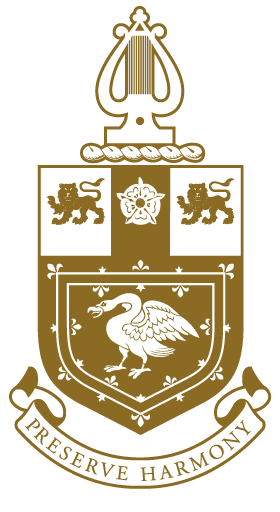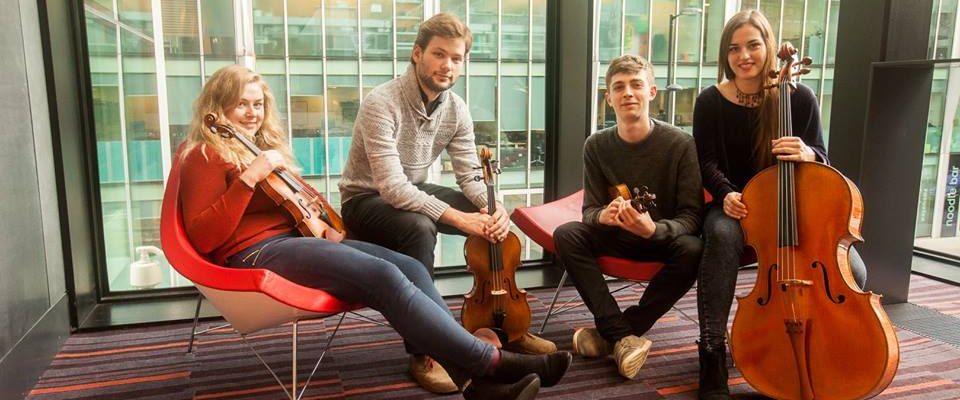Young Artist Interview: Catriona McDermid
I find that people often have a fascination with the bassoon and are always asking me why I decided to take it up. Much as I would like there to be a deep and meaningful story behind this decision, the reality is that I simply saw and heard it in an orchestral concert and thought it looked like it would be really fun to play a giant didgeridoo dressed up in a lot of bling. Fortunately, that first impression at nine years old hasn’t yet worn off!
My stubbornness as a child was definitely a key factor in getting me started as a bassoon player, leading me to choose an instrument that was actually taller than me when I started lessons, and giving me the drive to put in the practice to prove that I really, really would be able to play it. I was also helped by the fact that I’d been playing the piano and violin already since I was five, a result of having a mum who is a piano teacher (one benefit at least of listening to hours and hours of her teaching Old MacDonald…) and getting jealous having to sit around during my older sister’s violin lessons! From there I progressed from York’s punderfully named holiday orchestra Yorchestra, through the National Children’s Orchestras and National Youth Orchestra and then after school I wound up studying music at Lincoln College Oxford.
My years in Oxford were pretty hectic – it turns out it’s not easy balancing Oxford’s academic demands with a busy performance schedule, whilst also trying to maintain some kind of a social life. Despite a few too many slapdash essays churned out for world-experts on their respective subjects, Oxford was still a hugely formative experience in my development as a musician, not least due to the swathes of talented musicians to perform with, a depressing number of whom weren’t even studying music. On the academic side, certain parts of music academia seemed to me far too detached from my own real-life experience of music, but one current trend in musicology that really resonated with me was the idea of reassigning creative importance to performers and audiences. Typically, music histories have been solely focused on composers and their hallowed “musical works”, treasured artefacts that have to be reproduced as accurately as possible by musicians, and appreciated by audiences. Fascinatingly, it is easy to argue that this way of looking at music is a relatively recent construct, originating in the nineteenth century, and musicologists have for a while now been arguing the case for the creative importance and creative freedom of both performers and audiences.
Ironically my interest in this area of academia also had the effect of confirming my wish to pursue a performance career over one in academia, a career where I could more practically prove the creative importance of the performer. But learning to question the inbuilt hierarchies in classical music definitely changed my outlook as a musician, and probably indirectly sparked my interest in outreach work, which currently forms a substantial part of my freelance work. Classical music can seem very intimidating and inaccessible, given its culture of reception, where we sit down in absolute silence to revere “musical works” often in buildings built specifically for that purpose, have to adhere to strict rules about when and when not to clap… The list goes on! Hopefully, some of the outreach work I do helps to overcome these boundaries, by showing that this is not the only way to experience and appreciate classical music. I’ve been involved in a whole range of outreach projects during my master’s degree at the Royal College of Music, working on projects with Wigmore Hall’s Chamber Tots, CAVATINA Chamber Music Trust, BBC Proms Family Orchestra and also undertaking several sessions directly through The Musicians’ Company’s fabulous outreach programme.
Storytelling through music is often a particular focus of my outreach sessions and is something I’m currently working on very literally with my wind quintet Magnard Ensemble with fellow Yeoman Joseph Shiner. We’re in the midst of our Revolting Rhymes and Marvellous Music project, celebrating the centenary of Roald Dahl’s birth, where joined by a narrator and pianist we perform and workshop some wonderful musical settings of Roald Dahl’s poems. We’ve been touring various festivals around the country with these scrumdiddlyumptious musical tales, a Three Little Pigs and Little Red Riding Hood set by the composer Paul Patterson, and Dirty Beasts in a wonderfully gritty musical setting by Martin Butler. We’re particularly excited to be recording these works for our first CD coming out later this year on Orchid Classics.
Outside of outreach work, my music-making takes a whole variety of forms. Having just completed my master’s degree at the Royal College of Music I’m now enjoying piecing together various strands of work to form a freelance career. I am a keen chamber musician working as a concert artist with Magnard Ensemble and also with Njord Trio, an unusual trio of woodwind instruments, the bassoon, clarinet and flute. Although solo bassoon recitals aren’t in high demand, I’m also working as a soloist this year as an artist on the Countess of Munster Musical Trust recital scheme. Orchestral playing is a real passion of mine, and has ranged from the exhilarating and slightly terrifying experience of playing the first bassoon part opening The Rite of Spring in the Royal Festival Hall, to spending a week this summer with the Street Orchestra of London, taking music into unusual spaces, such as the Colnbrook and Harmondsworth immigration removal centres and a fully functioning moving carousel in Greenwich.
The final string to my bow is period performance work on the baroque bassoon, an instrument which I took up relatively recently during my master’s degree and have fallen in love with. For me, the amazing flexibility of sound on this instrument makes it completely worth overcoming the struggles of trying to play it in tune! My baroque playing took me on my most unusual musical venture to date, two weeks playing in the Misiones de Chiquitos baroque music festival in Bolivia with fellow musicians from the Royal College of Music. Who knew that there is, in fact, a large oeuvre of Bolivian Baroque music, which we played alongside Bolivian musicians in some truly spectacular churches built by Jesuit missionaries in the seventeenth and eighteenth centuries.
I thought I would leave you with an anecdote of a remarkable experience I had recently when playing and singing in a hospital ward. On this occasion I was singing folk songs and when I came to the beautiful Irish melody Danny Boy, a patient began to sing along with me. It was a sweet moment at the time but made so much more poignant when the patient’s daughter came up to me and the end of the session and said “Thank you so much for coming – we haven’t seen him respond to anything in two weeks”. This was an elderly patient who had lost the faculties of speech and was showing no visible signs of recognition or response to even his closest family around him and yet somehow music managed to make a connection and illicit a beautiful response. So whenever people question the importance of funding music and the arts, I’ll be there fighting right back!
Twitter handle @CMcdermid_
Magnard Ensemble – www.magnardensemble.org





